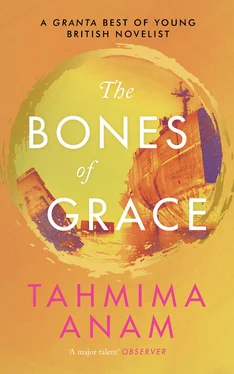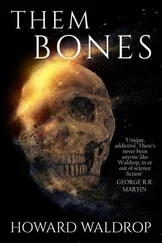Then, one day, Rashid went back to work at the factory. He got up in the morning, showered, dressed in slacks and a shirt with cufflinks, pulled on the watch my parents had given him as a wedding gift, and got into the back seat of his car. I watched all of this while still in my pyjamas, leaning out of the second-floor balcony and listening to the car door close behind him with a heavy snap. Then, contemplating the day ahead, I crawled back under the sheets and buried my face in the bed.
I flipped through the books on my shelf and found Moby-Dick , remembering how you had teased me that day at the airport. Moby-Dick got me thinking about Diana, still trapped underground, maybe even desecrated by now if what they said about unrest in that area was true. I imagined indifferent hands lifting her bones out of the ground, disturbing what had lain undisturbed for millennia, and this made me think about time and its inevitable forward march, that I too would be bones in a grave someday, that I would be dead, and then I started counting all the things I would regret if I were dying, and lying in bed on a Monday with nothing to do but read Moby-Dick was not on that list. I would not look back at my life and declare it well spent if this was what I had spent it on.
Again and again I thought of the conversation Rashid and I had had on our wedding night. I wanted to ask him about it again, to find out the details of how he had come to discover my secret, and why they had all — Dolly and Bulbul and Rashid and Abboo and Ammoo — decided never to offer me the comfort of their collective knowledge. But I didn’t want to see him laughing it off again, didn’t want him to reassure me and tell me it was all right, implying in his own way that, somewhere deep within, I owed him a debt for not minding, for treating me as though I were anyone else, a person with a bloodline that people could trace and rely upon. So I kept quiet, repeating the pattern of unsaying that had begun with my birth, and after a few weeks Melville became a friend, and the parties subsided, and I came to an accommodation with the fate to which I had submitted.
I don’t often think about my wedding, Elijah, but I have a photograph I carry around. I even brought it with me on this trip. I look beautiful, in the way of a person who has made an effort to look good for a camera. The sari Ruby and Dolly had chosen was tasteful and suited the copper tones of my skin. I had allowed a make-up artist, a friend of Sally, to paint my eyelids and blow a light dusting of glitter across my forehead. I am not as pretty any more, Elijah — in fact, by the time you arrived on the beach, that particular sheen was long gone — but in your presence, as you know, I was beyond pretty: I was majestic, a sovereign, like the Queen in Rokeya’s story.
And now we come to the time when you arrived at the beach and our lives turned to face one another again. The year I lived in the shadow of Grace and watched that great leviathan stripped down to her very bones. The year I broke your heart. I love this part of the story, not least because you are in it, but also because those few weeks we were together tell me everything I need to know about the rest of my life. Sure, it paints a picture of me that I am loath to remember, much less resurrect. But in order for us to come crashing down so decisively, we had to climb to those heights. We had to be those people whose fingertips brushed the atmosphere. I will always be grateful for that.
It is a year after the wedding. Rashid and I have been living in his parents’ house with the swimming pool on the roof and the locked bedroom doors. Anwar, in the meantime, is back in his village, carrying his secret, which is also my secret. He hasn’t begun to search for Megna, and he hasn’t yet arrived in the city where we will eventually meet. How I came to be there myself has to do with blood. My period was late. I had been assigned a car and a driver by the stern-looking man who managed Dolly’s household. The driver was young and skinny, and sank into his seat so that all I could see from the back was the sleeve of his shirt and his elbow as he manoeuvred the gearshift. I asked him to take me to the pharmacy in Gulshan 1, the one under the ice-cream parlour. The shopkeeper was standing behind a glass counter that was crammed with sanitary pads, and while I was searching my mind for the Bengali words for pregnancy test, I found myself re-annoyed by the fact that all the pharmacies were arranged in this way, and that if you wanted something embarrassing you had to ask someone to pull it down from a shelf or to open a cardboard box hidden in the back room. I decided my people were all terribly indiscreet. You couldn’t walk down an aisle and pick up condoms or tampons or haemorrhoid cream. The shopkeeper took my money and wrapped the rectangular box in a brown-paper bag. And then I went home and the two blue lines appeared immediately and I thought I would explode with rage.
Instantly I experienced an onset of symptoms. I felt a sharp pain in my abdomen and my legs were heavy and I wanted to devour a hamburger. I also had the overwhelming sense that my body had betrayed me by allowing this little seed to take root. What an ignorant little thing it was, didn’t it know that nothing had been right since the wedding, or earlier, since I agreed to marry Rashid, maybe even before that, when I had decided against the possibility of love — didn’t it know that it shouldn’t commit this one act, this act that had been denied my mother, and summed up an equation that had remained unsolved within me?
I sat with it for two weeks. Every morning I willed it to be over. Every morning I cursed this being whose provenance was more sure, within the first moments of life, than mine would ever be. I ate like the proverbial pig, ate everything, was repulsed by nothing except the little cluster of cells with my name on it. Every time I went to the bathroom I stared down at my blank, perfectly clean underwear. I contemplated dangerous acts, such as excessive drinking or jumping from high places, but I had never been courageous that way and I wasn’t about to start now. Dolly threw a party one day where everyone was asked to wear black and white and she put a tent out in the garden and hung strands of tiny lights from the trees, and I took a full plate up to my bedroom and ate what felt like an entire side of lamb.
The television was switched to the Discovery Channel and there was a programme on algae. Algae, the building blocks of life. At that moment, with the meat sitting densely in my stomach, I developed an attachment. I thought about meeting a person who was related to me by blood, something that had never happened to me before. Kin. I clutched my belly and took back all the things I had whispered to it. In the background an animated male voice said, The giant kelp is a large brown alga that may grow up to fifty metres in length , and I smiled and smiled to myself at this strange accident.
I told Rashid.
I don’t know how he had experienced the first year of our marriage. He seemed always upbeat and cheerful, and we’d had a few holidays together, a honeymoon in Thailand, a week in London, a business trip to Hong Kong to which I had tagged along. He had been right about the travel — it took the edge off of living in Dhaka. There were parties and family dinners and trips back and forth from Dhanmondi to see my grandmother. Sally and Nadeem’s baby was born in the summer, and we had watched them stumble clumsily around parenthood. The months passed. I read a lot of books. A hundred times I watched a YouTube video of Glenn Gould playing the thirteenth variation but that was the only paean to you I maintained. Although I still had had no word from Bart, a part of me was clinging to the possibility that he would suddenly summon me to Dera Bugti, so I didn’t look for a job.
Читать дальше












